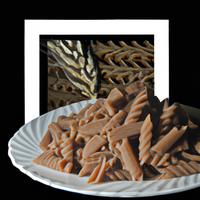
1 serving (100 grams) contains 124 calories, 5.8 grams of protein, 0.9 grams of fat, and 27.0 grams of carbohydrates.

Log this food in SnapCalorie

Nutrition Information
Calories |
248 | ||
|---|---|---|---|
% Daily Value* |
|||
| Total Fat | 1.8 g | 2% | |
| Saturated Fat | 0.4 g | 2% | |
| Polyunsaturated Fat | 0 g | ||
| Cholesterol | 0 mg | 0% | |
| Sodium | 10 mg | 0% | |
| Total Carbohydrates | 54 g | 19% | |
| Dietary Fiber | 9 g | 32% | |
| Sugars | 2 g | ||
| protein | 11.6 g | 23% | |
| Vitamin D | 0 mcg | 0% | |
| Calcium | 34 mg | 2% | |
| Iron | 3.6 mg | 20% | |
| Potassium | 154 mg | 3% | |
* Percent Daily Values are based on a 2,000 calorie diet. Your daily values may be higher or lower depending on your calorie needs.
Food Attributes
Source of Calories
About Whole-grain pasta
Whole-grain pasta is a nutritious alternative to traditional pasta, made from whole wheat flour that retains all parts of the grain, including the bran, germ, and endosperm. This keeps its fiber, vitamins, and minerals intact, offering a heart-healthy, energy-sustaining option. Originating from Italian cuisine, pasta remains a versatile global staple, and the whole-grain variety is an excellent base for countless dishes, from simple marinara to complex vegetable-packed creations. Rich in dietary fiber, whole-grain pasta supports digestion, helps regulate blood sugar levels, and promotes longer-lasting fullness. It also provides essential nutrients like B vitamins, iron, and magnesium. Though slightly denser and nuttier in flavor than refined pasta, it pairs well with vibrant sauces and hearty ingredients. However, it is still a carbohydrate-rich food, so portion control is important for those monitoring their calorie intake or blood sugar.



